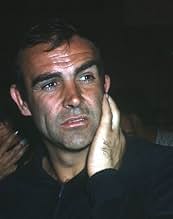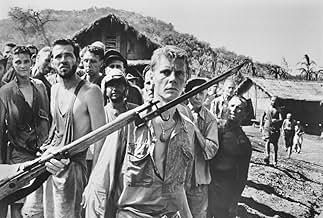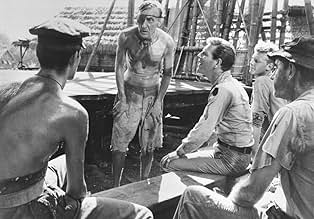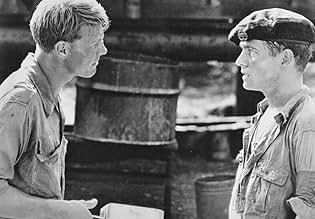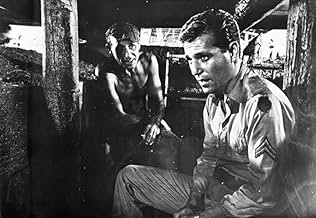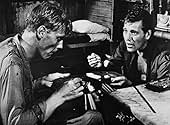IMDb RATING
7.5/10
5.5K
YOUR RATING
Fast-talking wheeler-dealer Corporal King is stuck in a Malaysian P.O.W. camp during World War II and uses bribery and larceny to take de-facto control of the camp.Fast-talking wheeler-dealer Corporal King is stuck in a Malaysian P.O.W. camp during World War II and uses bribery and larceny to take de-facto control of the camp.Fast-talking wheeler-dealer Corporal King is stuck in a Malaysian P.O.W. camp during World War II and uses bribery and larceny to take de-facto control of the camp.
- Nominated for 2 Oscars
- 3 nominations total
Joe Turkel
- Dino
- (as Joseph Turkel)
Michael Stroka
- Miller
- (as Mike Stroka)
- Director
- Writers
- All cast & crew
- Production, box office & more at IMDbPro
7.55.4K
1
2
3
4
5
6
7
8
9
10
Featured reviews
10mrinman
High drama set in a Japanese Prisoner of War Camp
King Rat is the oddball among James Clavellfs novels, but in my opinion is the best story. The stage is a Japanese Prisoner of War camp where allied officers are forced to literally eat dirt. The horrors of these camps are well documented and in Forbes adaptation of the book little is left to our imagination. That is not to say this is a vividly violent film. It most certainly is not, nor does it need to be as the sheer look of these poor wretched creatures is vivid enough.
While the backdrop is a prison camp, this is not a war movie. It is a tale of humanity and suffering. It centres around one character played brilliantly by Segal, who when outside the barbed wire fences is an ordinary corporal, while inside he is king. He shows ingenuity in obtaining supplies and living well while those around him starve. Soon the high-ranking officers are calling his shots and hence the title King Rat. The movie shows how far man will go, how much pride he can eat and how much dignity he can lose to survive.
The final scene when the prisoners are liberated could have been stronger but you have to realize the date the film was made. Even so, the look of disappointment on Corporal Kingfs face contrasting with the delight of the freed prisoners is quite incredible. An excellent film, highly recommended.
While the backdrop is a prison camp, this is not a war movie. It is a tale of humanity and suffering. It centres around one character played brilliantly by Segal, who when outside the barbed wire fences is an ordinary corporal, while inside he is king. He shows ingenuity in obtaining supplies and living well while those around him starve. Soon the high-ranking officers are calling his shots and hence the title King Rat. The movie shows how far man will go, how much pride he can eat and how much dignity he can lose to survive.
The final scene when the prisoners are liberated could have been stronger but you have to realize the date the film was made. Even so, the look of disappointment on Corporal Kingfs face contrasting with the delight of the freed prisoners is quite incredible. An excellent film, highly recommended.
The Best POW Film Ever!
This film, the best of 1965, was tough and disturbing and seriously under-rated. Great performances and a haunting soundtrack. George Segal, one of the best actors of the 60's and 70's creates an insidious yet charming character who runs things in the camp. James Fox (excellent actor who quit for many years on some kind of spiritual journey) is superb as is Tom Courtney and even Patrick O'Neal (who has never been impressive in any other film I can think of) delivers a punch as Max the stooge.
Bryan Forbes created a somber world of dog eat dog that should have been up for a host of awards. Throw in John Mills, James Donald and other familiar faces and you have a near-classic. A 9 out of 10. Best performance George Segal. Well worth your time.
Bryan Forbes created a somber world of dog eat dog that should have been up for a host of awards. Throw in John Mills, James Donald and other familiar faces and you have a near-classic. A 9 out of 10. Best performance George Segal. Well worth your time.
Clavell's most researched work
I saw "King Rat" on television shortly before going to Vietnam. A few months later I was reading the James Clavell novel while serving on DaNang Air Base with air force communications intelligence. It struck me that this book and this movie, which was "researched" by James Clavell when he was a POW in a camp near Singapore during World War II, have the real feel of what it is to be surrounded by enemy forces one almost never sees while being kept isolated on a hot, humid, dusty encampment It's an environment that brings out the best and the worst in mankind. The novel, the movie, and my own war zone experience also point out that adapting to a war zone and mastering the skills that enable one to survive and even prosper there do not necessarily mean that the individual will subsequently be adaptable to "civilization" when he returns to it. The novel, the movie, and my own experiences also raise the questions that are raised in "The Man in the Gray Flannel Suit" (and even in "Rambo" for that matter): Which is more of a challenge and which is the "real" life: adapting to the war zone as a youth or the expectations by "civilization" that you readjust to life back in "the world" as if nothing had happened?
"Gather round to hear the words of the King"
Many unforgettable films are to be found in the annals of World War II. Avid movie goers know which ones they are. Among my favorites are 'The Great Escape, The Blue Max, Cross of Iron, and of course, Sink The Bismark," But occasionally, a film is made which deviates from the superficial and ventures into the realm of the incredible. That is the essence of "King Rat." Here viewers are exposed to the harsh realities of what it takes to survive in a hell hole, like a Japanese Prisoner of War Camp. Our hero, one, Cpl. King (George Segal) dwells amid hundreds of starving British and a few American P.O.W.s. However, unlike the rest, who are seen as listless, emaciated and dying , King is for the most part, healthy and appears none the worse for wear. One individual who daily wants to know why King, walks about nearly impervious to the obvious conditions is Lt. Robin Grey (Tom Courtenay, convincing in this role). It is his job as Camp Provost Marshal, to maintain order in a camp where smuggling, trading with the enemy and outright theft is common place. Knowing King is secretly dealing with the enemy, Robin daily waits for him to make a mistake. This will be difficult as King relies on the fact, everyone, regardless of rank seeks to stay alive by whatever means. Aiding King is Peter Marlowe (James Fox) who despite his higher rank readily joins King's other 'employees' such as Tex, (Todd Armstrong), Top Sgt. Max (Patrick O'Neal, Lt. G.D. Larkin, (Denholm Elliott), and Col. George Smedley-Taylor (John Mills). But it is the camp Doctor (James Donald) who asks the pertinent question of King. "What is your secret Cpl? Medically, it should be worth a fortune." Throughout this stark and tragic Black and White film, one is equally curious, until we discover King's dark secret. Once we know it, the anger is dissipated by the fact, the war will eventually be over. Then Cpl. King will be called upon to reveal it. A superior movie with top notch acting by every actor. ****
A slice of WWII Japanese Prison Camp
We all wonder what happens when we die, this movie is about what happens when we live at any cost, put in the context of a Japanese prison of war camp in WWII. A serious film with enough action to keep it alive while delivering a message. You won't be bored.
George Segal plays his greatest role, tough, smart, without shame. How he became a banjo player I don't know. (jmho)
George Segal plays his greatest role, tough, smart, without shame. How he became a banjo player I don't know. (jmho)
Did you know
- TriviaIn interviews, Writer and Director Bryan Forbes said he had to fight the Screen Actors Guild over the most of the fifteen British Equity members he wanted to cast. The Screen Actors Guild wanted British SAG members, most of whom were fairly elderly, and not suitable for this movie.
- GoofsThe shoulder patch that Cpl. King (George Segal) is wearing is that of the 34th Infantry Division (Red Bull). The 34th ID served in the European Theater of Operations, not in the Pacific. The 34th ID patch is a black Mexican water jug called an "olla" with a red bull's skull superimposed. Almost all the POWs at Changi were British or Commonwealth soldiers captured at the surrender of Singapore on Feb. 15, 1942, but there also were POWs from the Netherlands East Indies, which surrendered in March. The only sizable U.S. unit at Changi was Co. E, 2nd Btn, 131st Field Artillery Regt., part of the Army's 36th ID (the "Texas Division"). The Second Battalion, which became known as the Texas National Guard's "Lost Battalion," was detached from the 36th ID in the States and shipped to the Pacific in November 1941, but when the Japanese attacked the Philippines in December, the battalion's convoy was diverted from Manila to Brisbane, Australia. In January the battalion was sent to Java, in the Netherlands East Indies. The battalion was the only U.S. ground unit in Java when the NEI surrendered to the Japanese on March 9, 1942. Most men in the battalion were transferred to Singapore later that year and, along with thousands of British and Commonwealth soldiers, were used by the Japanese as slave labor to build the infamous "Death Railway" connecting Bangkok to Rangoon. Company E of the 2nd Battalion, separated from the rest of the unit on Java, was at Changi briefly in October-November 1942 before being sent to Japan as slave laborers. It would be plausible that Cpl. King was a member of 2nd Battalion, 131st Field Artillery, and that the movie's costumers got the wrong division patch for his uniform.
- Crazy credits[Prologue] This is not a story of escape. It is a story of survival.
It is set in Changi Jail Singapore, in 1945
The Japanese did not have to guard Changi as a normal prison of war camp. The inmates of Changi had no friendly Swiss border or any other neutral country within reach. They were held captive not so much by high walls, or barbed wire, or machine-gun posts, but by the land and sea around them - and the jungle was not neutral, nor was the ocean.
They did not live in Changi. They existed. This is the story of that existence.
- ConnectionsFeatured in A Walk on the Moon (1999)
- SoundtracksAdeste Fideles
(uncredited)
Written by Frederick Oakeley (1841)
Variation sung in distant background by POWs
- How long is King Rat?Powered by Alexa
Details
- Release date
- Country of origin
- Languages
- Also known as
- El caudillo de los desalmados
- Filming locations
- Production company
- See more company credits at IMDbPro
- Runtime
- 2h 14m(134 min)
- Color
- Aspect ratio
- 1.85 : 1
Contribute to this page
Suggest an edit or add missing content


